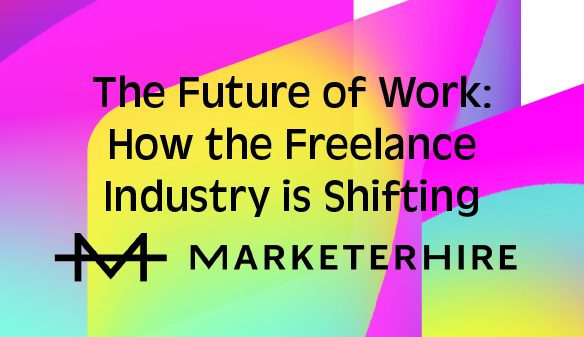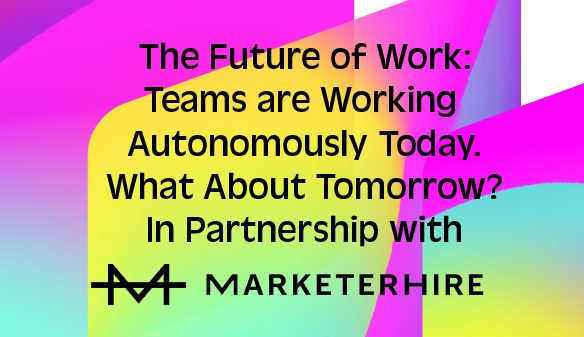Table of Contents:
- Freelancers Have Traditionally Been in Creative or Production
- Freelance Opportunities are Growing Across Capabilities
- Use Niche Platforms to Find Specialized Freelancers
- Benefits of Using Freelancers
- How to Support Independent Professionals
The Future of Work is Now, and It is Freelance. After nearly a year and a half of remote working, employees are working 2.5 hours longer. Moreover, companies are executing new initiatives and strategies for the first time. This, coupled with fewer resources after widespread layoffs, has led to a new reliance on outside help: freelancers.
COVID-19’s acceleration of the industry proves that collaborations between companies and freelancers are here to stay — 12% of the U.S. workforce started to freelance for the first time in 2020, and 47% of hiring managers are more likely to hire freelancers, according to a 2020 Upwork study. The number of people freelancing will likely increase in the coming years, and will keep extending beyond traditional freelance roles.
But this rapid shift raises important questions:
How do companies find the right freelancers? How can both organizations and the industry at-large better support independent professionals? Below, we explore how companies partner with independent collaborators with Webby Award winner m ss ng p eces, and speak with two senior-level freelancers about their experiences.
Freelancers Have Traditionally Been in Creative or Production
Previously, most traditional freelance roles were in production or creative. While opportunities tend to grow in other capacities or roles, the production industry sets the standard for how external talent can be added to support in-house efforts. This is true for content and production companies like m ss ng p eces, the 2020 Webby Production Company of the Year, a production and entertainment partner creating content and immersive experiences for clients globally.
According to m ss ng p eces Managing Partner Kate Oppenheim, leveraging specialized talent in addition to its robust lineup of in-house directors, was key to producing immersive projects like Invisible Hate, a 2021 Webby Winner in virtual and remote experiences, and Black Love Is, a 2021 Webby Nominee in video.
“Staffing up projects is one of the artforms of our business,” Oppenheim said. Her team produces specialized work, and finds balance in making sure there is “a m ss ng p eces hand firmly at the wheel, but also that [they] have the specific skill sets necessary to executive anything the creatives dream up.” That team will inevitably be hybrid in some form.
“Staffing up projects is one of the artforms of our business,” Oppenheim said.”
Freelance Opportunities are Growing Across Capabilities
Freelance opportunities have already been growing. Boston Consulting Group’s 2018 study of 6,500 executives worldwide found that nearly 40% expected to increase use of freelancers in the next five years. Opportunities in more industries skyrocketed in 2020 as COVID-19 shifted the direction of businesses.
“Over time, and more recently, there’s been kind of a wave for Account [Management],” said Freelance Account and Brand Lead Lisa Paravano. Companies should lean into using freelance talent for larger business and strategic development. Paravano has experienced this for seven years as a freelancer Group Account Director for agencies and brands like Pernod Ricard, República Havas, Berlin Cameron, and more.
Use Niche Platforms to Find Specialized Freelancers
As companies navigate new business directions and restructuring in the wake of COVID-19, they can lean on senior freelancers, even when highly specialized professionals are needed. Beyond traditional platforms like LinkedIn or Upwork, niche platforms like MarketerHire, Arc for remote developers, or TopTal for other tech talent, connect companies with growing need for experts who can start quickly.
MarketerHire helps companies develop and scale their marketing — with pre-vetted freelance talent specializing in paid search, brand marketing, SEO, growth, social media, content marketing, and more. Only the top 5% of applicants are approved to be on the platform, ensuring companies are matched with senior-level talent. The rise of niche recruiting platforms, like MarketerHire, reflect more companies’ need for specialized freelancers. Experienced freelancers bring value outside of their specific skills. We spoke to two experienced freelancers, Paravano and Adina Birnbaum, about the benefits independent professionals bring to organizations.
1. Senior Freelancers Can Fill-in Business + Staffing
Paravano’s freelance contracts are typically six-months long, to cover maternity leave or gaps of time, focus on new business, and help structure or run a team. “[An] interim person like [me] can be brought in to help interview, screen people and do the job of a traditional account lead,” said Paravano.
2. They Can Launch Strategic Initiatives
Adina Birnbaum, a freelance Executive Producer based in New York City, has experienced this over seven years of producing and consulting.
When she was brought into projects at Instagram, Squarespace and Chobani, each “had just established their in-house creative capabilities,” Birnbaum said. “Creating templates and contracts, finding workarounds where there were gaps in resourcing, and navigating more administrative duties was required in addition to traditional project-based production responsibilities.” The trade-off? A holistic view of the brand, including strategy development, innovation and beta testing, said Birnbaum.
3. No Need for Lengthy Onboarding
Experienced freelancers have been executing their roles for years and require less hand holding, said Paravano. Marketers know their channels well, and in her case, a Group Account Director knows exactly how to lead a team–especially crucial as companies change business directions in the wake of the pandemic.
“People aren’t sure where budgets are going to land, or if clients are going to sign scopes. But they need work to keep moving,” said Paravano. “When I’m hired it’s because I’ve been there and done that, and I don’t need a lot of coaching.”
How to Better Support Freelancers
1. Set Proper Expectations
When brands approach independent artists because they admire their work, they should establish trust and communication. “It’s important to set expectations from the beginning about how that artist is expected to work in tandem with the brand’s needs,” she said. Will the independent artists have freedom, or will it be a traditional executional relationship? Establishing the ground rules is vital.
2. Define Your Method to Onboard Remotely
The absence of in-person onboarding and informal interactions can leave freelancers struggling to acclimate as quickly. “Now that work is 100% remote, many onboarding procedures have not evolved to compensate,” said Birnbaum. Create a process to help ease the transition into a new group and team.
3. Commit to Good Compensation and Benefits
Companies should be prepared to compensate freelancers properly, but what about other benefits? For Birnbaum, as more companies shift to employing “permalancers” or W2 contractors, benefits should become standardized.
“Many of the tech companies continue to be leaders in this effort, providing comprehensive benefits to all employees, including medical, dental, vision, 401K, insurance discounts, ancillary benefits including disability, and legal assistance effective immediately, if desired,” she said.
Many companies, such as agencies, do not. Groups like the Freelancers Union work to compensate for this, connecting freelancers with similar benefits as full-time employees—like insurance, a database of resources to navigate COVID-19, finances and more.
According to Paravano, offering benefits goes beyond a conversation about ethics. “The way to retain top level talent in that pool would be to offer some sort of benefits, but then do they stop being freelance?”
More Resources from MarketerHire:



 Twitter
Twitter

